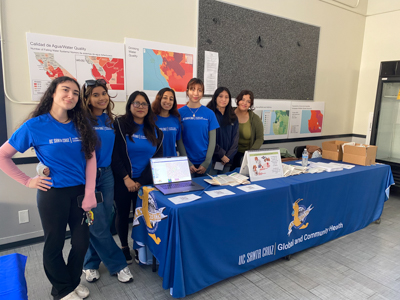Health
Tools and training combat health impacts on farmworkers that are worsened by climate change
A UC Santa Cruz-led project has launched a new bilingual app allowing the public to assess and anonymously report climate-related health risks in agricultural communities statewide. Over 50 newly trained community health advisers will use the app and other tools to teach farmworkers about health risks worsened by climate change and the remedies available through state-mandated health protections.


A two-year state-funded project to protect farmworker communities from the health impacts of climate change is close to wrapping up, but its impacts are set to ripple out across California for years to come.
Since the start of the project in 2023, UC Santa Cruz and community partners have successfully launched a new bilingual app, through which the public can now monitor and report health risks statewide, and graduated over 50 newly trained promotores, community health advisers who lead health and safety outreach and social protection efforts.
UC Santa Cruz Distinguished Professor Matt Sparke led the team, with support from a $1.99 million California Climate Action Grant. Sparke is the co-director of UCSC’s Global and Community Health Program and an agronomist with the campus’s UC-designated Agricultural Experiment Station. The project aims to tackle issues like extreme heat, poor air quality, drinking-water pollution, and mold and pesticide exposure that are worsened by climate change and disproportionately affect farmworkers, harming physical and mental health while also compounding social and political vulnerabilities.
“There are some long-standing and well-known threats facing agricultural communities in California that have been compounded by climate changes,” Sparke said. “We wanted to provide a set of trainings that offer people practical things they can do in their communities to protect themselves in the face of these threats, as well as an app that shows where risks come together on the ground. The app collects and makes more visible existing data from the state of California, and it allows farmworkers to report their experiences anonymously, to show state agencies where there are clusters of risks that aren’t being mitigated.”
To develop the training program and app, the project tapped a broad contingent of 18 faculty members at UC Santa Cruz and other UCs for their issue expertise and technical knowledge. It then paired those insights with the practical experience and organizing savvy of community partners like Salud Para La Gente, the Center for Community Advocacy, the Community Action Board of Santa Cruz County, Community Health Trust of Pajaro Valley, the LEAP Institute, Mujeres en Acción, and Ventures.

“Our training program wasn’t just knowledge going out from the university, it was developed with community partners as a shared and reciprocal community of practice,” Sparke said. “As a result, we now have an amazing cadre of over 50 promotores who are trusted and very well connected in communities across the Pajaro, Salinas, and San Joaquin Valleys. And they can continue to take this knowledge and the resources that we’ve developed together out into the community to address health risks and remedies with farmworkers directly.”
The program ultimately aims to help farmworkers learn about and take advantage of required state-mandated health protections and to demand change in cases where those protections may be insufficient or absent. Sparke says some of the project’s partners have hopes of expanding the model to cover other key agricultural regions of the state, like the Coachella and Imperial Valleys. In the meantime, he hopes farmworkers and others will engage with community education efforts related to the program and use the new app to understand risks and report problems in their local community.
“If someone is working in the fields and experiencing dehydration or fainting from extreme heat, or suffering from bad air quality without a mask, then people in state agencies need to hear about that,” Sparke said. “The app is a way for farmworkers to have their voices heard anonymously and their experiences put on the map. We really hope this can be a powerful tool for community health awareness and advocacy moving forward.”